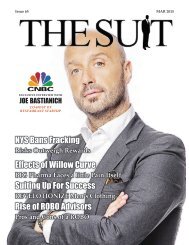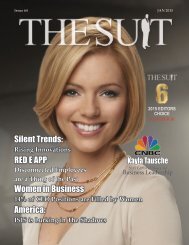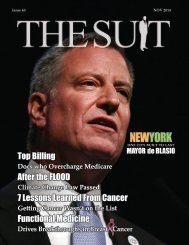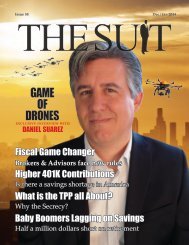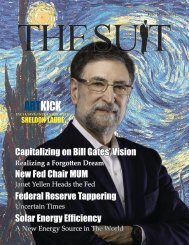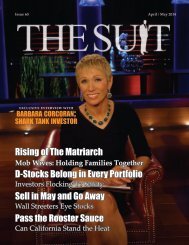o_19grqq7snim9mn019q11f7ds26a.pdf
Marcus Lemonis, a serial entrepreneur and host of the show “The Profit” on CNBC, is a true survivor in the corporate world. The native-born Lebanese business man endured the chaos of a civil war in Beirut and eventually moved to Miami. Lemonis was exposed to the automotive industry throughout his upbringing - his grandfather owning two of the largest Chevrolet dealerships in the United States and Lee Iacocca serving as the family friend and later mentor to Lemonis. On page 12, we conducted an interview with “Profit” host Marcus Lemonis, who offers struggling small businesses capital investment and his expertise in exchange for an ownership stake in the company. In the latter part of the magazine, we interviewed countless wealth advisors during these tough economic times. We recognize that some of the changes in 2013 and 2014 require relevance for financial planners. Therefore, the financial industry continues to push for more realistic standards and reforms.
Marcus Lemonis, a serial entrepreneur and host of the show “The Profit” on CNBC, is a true survivor in the corporate world. The native-born Lebanese business man endured the chaos of a civil war in Beirut and eventually moved to Miami. Lemonis was exposed to the automotive industry throughout his upbringing - his grandfather owning two of the largest Chevrolet dealerships in the United States and Lee Iacocca serving as the family friend and later mentor to Lemonis. On page 12, we conducted an interview with “Profit” host Marcus Lemonis, who offers struggling small businesses capital investment and his expertise in exchange for an ownership stake in the company. In the latter part of the magazine, we interviewed countless wealth advisors during these tough economic times. We recognize that some of the changes in 2013 and 2014 require relevance for financial planners. Therefore, the financial industry continues to push for more realistic standards and reforms.
You also want an ePaper? Increase the reach of your titles
YUMPU automatically turns print PDFs into web optimized ePapers that Google loves.
y amy m. armstrong<br />
Transparency:<br />
Potentially Overwhelming<br />
As the legislated mandates of<br />
Dodd-Frank and the voluntary<br />
requirements of the Basel III agreement<br />
take hold in the nation’s financial<br />
services sector, increased transparency<br />
is the intended result. Under<br />
the Title IX provisions of Dodd-Frank,<br />
a stricter series of investor protection<br />
requirements were created. While<br />
financial advisors welcome investor<br />
protection, some do question whether<br />
the tsunami of paperwork and electronic<br />
communication now required<br />
for compliance with these updated<br />
regulations is truly in the best interest<br />
of the investing consumer.<br />
Doug Howes is one of those financial<br />
advisors considering the implications.<br />
He is the CEO of the independent<br />
financial services firm Sapphire<br />
Wealth Management, LLC, based in<br />
Andover, Massachusetts.<br />
“In our experience the outcome of<br />
these regulations has created a new<br />
issue,” Howes notes. He agrees that<br />
clients should be fully informed regarding<br />
their personal money choices.<br />
It’s important – and full disclosure<br />
is something the team at Sapphire<br />
Wealth has been doing since the inception<br />
of the firm in 2005. However,<br />
he has a few concerns regarding the<br />
latest developments in this area from<br />
a regulatory standpoint.<br />
“On the surface, you would think<br />
it is a positive. However, in order<br />
to adhere to the current regulations<br />
for transparency, it requires considerably<br />
more disclosure. This has led<br />
to significantly more information being<br />
delivered to the clients’ mail and<br />
in-boxes. Our clients have expressed<br />
to us how this can be overwhelming.<br />
I am not 100 percent convinced that<br />
transparency as it looks today – and<br />
I agree that transparency is necessary<br />
– but as it looks today, is not doing<br />
more harm than good.”<br />
He says this because his greatest<br />
concern is that the sheer volume of<br />
paperwork and email being sent to<br />
clients could cause already information-saturated<br />
clients to overlook the<br />
one vital document that truly does require<br />
their attention.<br />
This is one of the reasons he remains<br />
in constant contact with the clients<br />
of the firm. Initially, his goal was<br />
to build a firm based on exceptional<br />
client relationships. It was something<br />
his grandfather – a man who spent<br />
his career in the service industry –<br />
had always advised him to do.<br />
“He told me to be friends with my<br />
clients, and to ALWAYS do and recommend<br />
what is in their best interest<br />
and not my own,” Howes recalls.<br />
From the onset of Sapphire Wealth,<br />
Howes’ philosophy has been to synergize<br />
the high quality research skills<br />
he learned while working with Putnam<br />
Investments and MetLife with<br />
strict adherence to compliance, all<br />
the while remaining committed to<br />
fostering earnest relationships with<br />
THE SUIT MAGAZINE - JULY 2014




